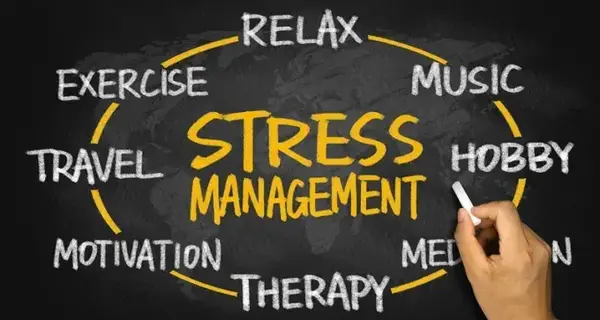Do you ever feel like stress is the uninvited guest in your life, always hanging around, ready to ruin your day? You’re not alone. In today’s fast-paced world, stress can creep in like a shadow, impacting our mental and physical health. But what if I told you that effective stress management techniques can help you take back control? Let’s dive into some practical strategies that can help you live a more balanced life.

Understanding Stress and Its Impact on Your Life
Stress is your body’s response to challenges and demands. It can be triggered by work pressures, personal relationships, financial issues, and even health concerns. When left unchecked, stress can lead to various health problems like stress management, anxiety, depression, and heart disease. Learning to manage stress effectively is essential for a balanced life.
1. Identify Your Stressors
The first step in effective stress management is identifying what triggers your stress. Ask yourself:
- Is it work deadlines?
- Is it family responsibilities?
- Is it financial worries?
Keeping a stress journal can help you spot patterns. Write down when you feel stressed and what you think caused it. This exercise can reveal insights into your stressors, making them easier to tackle.
2. Practice Mindfulness for Stress Relief
Mindfulness is all about being present.
How to Get Started with Mindfulness
Here’s how to get started:
- Meditate: Focus on your breath and clear your mind. Apps like Headspace or Calm can guide you.
- Take mindful walks: Pay attention to the sights, sounds, and smells around you.
Mindfulness helps reduce anxiety and boosts your mood. Plus, it’s an effective stress management technique that fits into any busy schedule.
3. Stay Active: The Physical Benefits of Exercise
Exercise is a powerful stress buster. It releases endorphins, the body’s natural mood lifters.
Simple Ways to Incorporate Exercise
You don’t need to hit the gym for hours. Here are some easy options:
- Walk: Even a 20-minute walk can lift your spirits.
- Dance: Put on your favorite tunes and dance like no one’s watching.
- Yoga: This combines movement with mindfulness, making it a great way to manage stress.
Finding an activity you enjoy is key. The more fun it is, the more likely you’ll stick with it.
4. Prioritize Sleep for Better Stress Management

Sleep and stress are closely connected.
Tips for Improving Your Sleep Quality
“When you’re stressed, it’s harder to sleep, which can impact your overall health. Lack of sleep not only increases your stress levels but also weakens your immune system. Aim for 7-9 hours of quality sleep each night to help your body recover and stay strong. For more tips on supporting your health, check out 10 Simple Ways to Boost Your Immune System Naturally.”
- Create a bedtime routine: Wind down with relaxing activities like reading or taking a warm bath.
- Limit screen time before bed: The blue light from devices can disrupt your sleep.
- Make your bedroom a sleep sanctuary: Keep it dark, cool, and quiet.
Getting enough sleep is vital for effective stress management.
5. Connect with Others for Support
Social support is crucial for managing stress.
Ways to Build Connections
Talk to friends or family about what you’re going through. Sometimes, just sharing your feelings can lift a weight off your shoulders. If talking isn’t your style, consider:
- Joining a support group: Many people find comfort in knowing they’re not alone.
- Volunteering: Helping others can improve your mood and reduce stress.
Building strong connections can create a network of support, making it easier to handle life’s challenges.
6. Set Boundaries to Protect Your Well-Being
It’s okay to say no sometimes.
How to Set Healthy Boundaries
Overcommitting can lead to burnout and increased stress. Be clear about your limits, both at work and in your personal life.
- Assess your commitments: Look at what you’ve agreed to and see if it’s manageable.
- Communicate: Let others know when you’re feeling overwhelmed.
Setting boundaries is crucial for effective stress management.
7. Practice Relaxation Techniques Regularly
Incorporating relaxation into your daily routine can combat stress effectively.
Techniques to Try
Here are a few techniques to try:
- Deep Breathing: Take slow, deep breaths. Inhale for four counts, hold for four, then exhale for four. Repeat this a few times.
- Progressive Muscle Relaxation: Tense each muscle group for a few seconds and then relax them, starting from your toes up to your head.
- Visualization: Imagine a peaceful scene, like a beach or a mountain. Focus on the details and let your mind drift there.
These techniques help lower your heart rate and reduce anxiety.
8. Embrace a Healthy Diet for Mental Clarity
What you eat can influence your stress levels.
Foods That Help Reduce Stress
Consider incorporating more of these foods into your diet:
- Fruits and vegetables: They’re packed with vitamins and antioxidants.
- Whole grains: Foods like oats and brown rice can help regulate mood.
- Lean proteins: Sources like chicken and fish provide essential nutrients.
- Healthy fats: Nuts, seeds, and avocados can help reduce inflammation.
Staying hydrated is equally important. Aim to drink plenty of water throughout the day.
9. Limit Caffeine and Alcohol Consumption
While caffeine can give you a temporary boost, too much can increase anxiety and disrupt your sleep.
Finding Healthier Alternatives
Consider cutting back if you find yourself reaching for that extra cup of coffee. Similarly, alcohol might seem like a stress reliever, but it can lead to increased anxiety in the long run. Find healthier alternatives, like herbal teas or sparkling water.
10. Seek Professional Help When Needed
Sometimes, stress can feel overwhelming. If you find it difficult to cope, seeking professional help is a wise decision.
Benefits of Talking to a Professional
Counselors and therapists can provide support and teach you effective stress management techniques tailored to your situation. Don’t hesitate to reach out if you need it.
Conclusion: Take Control of Your Stress
“Stress is a part of life, but it doesn’t have to take over. With effective stress management techniques, you can reclaim your balance and well-being. Start small. Pick one or two strategies that resonate with you and give them a try. Over time, you’ll build a toolkit that helps you navigate life’s challenges with greater ease. For more information on managing stress and maintaining mental health, you can explore resources from the World Health Organization.“
Remember, it’s all about finding what works for you. So, which stress management technique will you try first?
FAQs
1. What are some quick stress relief techniques?
- Deep breathing
- Taking a short walk
- Listening to music
2. How can I tell if I’m too stressed?
Signs include irritability, fatigue, sleep disturbances, and difficulty concentrating.
3. Can exercise really help with stress?
Yes! Exercise releases endorphins, improving your mood and reducing anxiety.
4. What role does nutrition play in stress management?
A balanced diet supports overall health and helps regulate mood, reducing stress levels.
5. When should I consider professional help for stress?
If you’re feeling overwhelmed, struggling to cope, or experiencing symptoms of anxiety or depression, it may be time to seek professional guidance.





